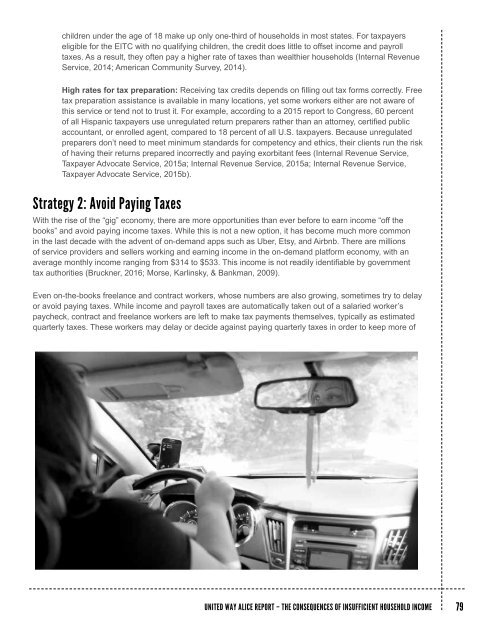The Consequences of Insufficient Household Income
This new Consequences of Insufficient Household Income report provides a deeper level of understanding of the choices that ALICE and poverty-level families across the country make when they do not have enough income or assistance to afford basic necessities, and the consequences of those choices.
This new Consequences of Insufficient Household Income report provides a deeper level of understanding of the choices that ALICE and poverty-level families across the country make when they do not have enough income or assistance to afford basic necessities, and the consequences of those choices.
You also want an ePaper? Increase the reach of your titles
YUMPU automatically turns print PDFs into web optimized ePapers that Google loves.
children under the age <strong>of</strong> 18 make up only one-third <strong>of</strong> households in most states. For taxpayers<br />
eligible for the EITC with no qualifying children, the credit does little to <strong>of</strong>fset income and payroll<br />
taxes. As a result, they <strong>of</strong>ten pay a higher rate <strong>of</strong> taxes than wealthier households (Internal Revenue<br />
Service, 2014; American Community Survey, 2014).<br />
High rates for tax preparation: Receiving tax credits depends on filling out tax forms correctly. Free<br />
tax preparation assistance is available in many locations, yet some workers either are not aware <strong>of</strong><br />
this service or tend not to trust it. For example, according to a 2015 report to Congress, 60 percent<br />
<strong>of</strong> all Hispanic taxpayers use unregulated return preparers rather than an attorney, certified public<br />
accountant, or enrolled agent, compared to 18 percent <strong>of</strong> all U.S. taxpayers. Because unregulated<br />
preparers don’t need to meet minimum standards for competency and ethics, their clients run the risk<br />
<strong>of</strong> having their returns prepared incorrectly and paying exorbitant fees (Internal Revenue Service,<br />
Taxpayer Advocate Service, 2015a; Internal Revenue Service, 2015a; Internal Revenue Service,<br />
Taxpayer Advocate Service, 2015b).<br />
Strategy 2: Avoid Paying Taxes<br />
With the rise <strong>of</strong> the “gig” economy, there are more opportunities than ever before to earn income “<strong>of</strong>f the<br />
books” and avoid paying income taxes. While this is not a new option, it has become much more common<br />
in the last decade with the advent <strong>of</strong> on-demand apps such as Uber, Etsy, and Airbnb. <strong>The</strong>re are millions<br />
<strong>of</strong> service providers and sellers working and earning income in the on-demand platform economy, with an<br />
average monthly income ranging from $314 to $533. This income is not readily identifiable by government<br />
tax authorities (Bruckner, 2016; Morse, Karlinsky, & Bankman, 2009).<br />
Even on-the-books freelance and contract workers, whose numbers are also growing, sometimes try to delay<br />
or avoid paying taxes. While income and payroll taxes are automatically taken out <strong>of</strong> a salaried worker’s<br />
paycheck, contract and freelance workers are left to make tax payments themselves, typically as estimated<br />
quarterly taxes. <strong>The</strong>se workers may delay or decide against paying quarterly taxes in order to keep more <strong>of</strong><br />
UNITED WAY ALICE REPORT – THE CONSEQUENCES OF INSUFFICIENT HOUSEHOLD INCOME<br />
79




